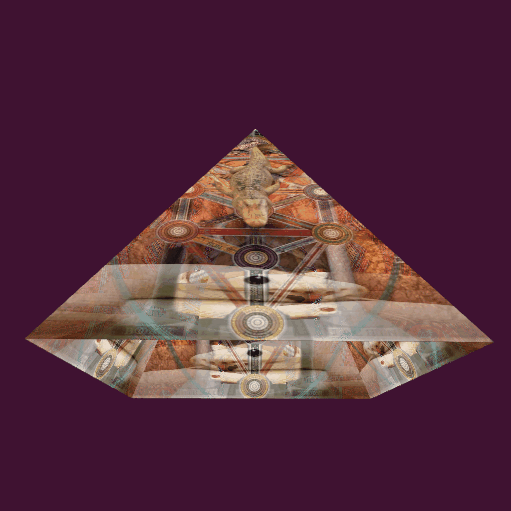Cryptocurrency in the new banking world order of DEFI
In transferring digital asset artwork to the digital ledger. NFT creator Claude Edwin Theriault of MBF-Lifestyle discovered opposites oppose.

Cryptocurrencies may be the end of the banking industry as we know it.
While transferring his digital asset artwork to the digital ledger of the Ethereum blockchain of opensea. NFT creator Claude Edwin Theriault of MBF-Lifestyle discovered the opposites of Cryptocurrency and federal reserve banking and how they have traditionally not mixed at all... go figure.
We will look back and say, Remember when we had banks?
Since Cryptocurrency has been a challenge for the traditional financial institution framework, the emergence of crypto banks added to the complexity in the post-2022 times of significant change.
This creates an exciting dynamic between decentralized fintech and big bank cartels that have historically dominated the banking system until now.
The cryptocurrency sphere has been tipped as the future of finance. One central question arises from whether crypto companies - such as exchanges and lending protocols - will ever move towards traditional comptroller of the currency services like the centralized CEFI of the soon-to-be past.

While crypto platforms provide services that banks do, they need to be sufficiently overlapping to make buying a bank beneficial. There could be some motivation to gain control of the competition and take back some profits taken away by the centralized World Economic Forum supporting banks.
A decentralized autonomous organization (DAO) could even be interested in buying a bank for kicks and giggles since the DEFI and DAO sphere is made up of really young tech-savvy people having a lot of fun coding money out of computer code instead of government sanction. Something banks may never be comfortable with, since bitcoin ATMs with debit products and services have been here since 2021; crypto assets like stablecoins with volatility, yes, but providing S-Bot interest gains far above what the most prominent banks could ever dream of delivering to the public.
However, there remain plenty of obstacles cryptocurrencies face before crypto.
-Led banks can become the norm. However, they will soon, since the current fiat currency life cycle is ending like always.
Cryptocurrency Bitcoin Daddi is the new central bank digital regulator.
For starters, crypto banks need to comply with a range of regulations. The bank and its clients must abide by Know-Your-Customer (KYC) and Anti-Money Laundering (AML) laws. Big banks need these to prevent fraud and money laundering, but they present an issue for the morph switch of months-old DEFI replacing centuries-old CEFI.
Bitcoin is the end-all cryptocurrency of all cryptocurrencies.
If cryptocurrency is your end game, buying a bank rather than creating a crypto bank has advantages. However, it might not be as simple as you think to acquire an already established one - banking behemoths like JPMorgan Chase & Co. with expansive assets usually won't be up for grabs. But if you're willing to invest the capital, buying an individual bank branch is possible. The process would require both personal qualifications and legal scrutiny to ensure that only trustworthy people own banks - after all, you wouldn't want Yosemite Sam running yours! Those looking to purchase a troubled bank must also meet specific capital reserve requirements that further complicate the process. However, tables are turning, as is the tide in our historic fourth turning period.
Cryptocurrency and I at MBF-Lifestyle
The crypto world is rapidly transforming as new fintech solutions are created for everyday banking. Defi platforms form the hub of this revolution. Still, even outside of these projects, there is an overlap between cryptocurrencies and traditional banks that creates novel user opportunities—this clash of the old and new breeds a more innovative sector, which looks set to continue. As we move forward, the banking services infrastructure may need help keeping up with the pace of change in the digital sphere, leaving ambitious projects and brave investors to blaze a trail for those searching for more accessible and faster financial transactions.
Future of crypto in the conservative yet shady financial services industry

Embedded banking is a revolutionary idea that has the potential to revolutionize the way consumers access their checking accounts. By tying solutions into the customer's existing process, using technology like crypto fintech, customers can efficiently shop for these solutions at the point of need instead of seeking them separately. This makes accessing solutions like mortgages more seamless during the home shopping process. Crypto fintech solutions open up possibilities in embedded banking as P2P interactions become more accessible. As such, it is worth exploring this crypto market concept further and seeing how it could be applied in different industries.
Crypto on the go for your active lifestyle.
Banks have been forced to go digital in recent years to stay competitive, and many are now recognizing the potential of crypto. While some banks have gone so far as to purchase cryptocurrency firms, others are adapting the technology without buying anything. The high influx of capital into the crypto sphere is no secret, putting pressure on banking industry players to embrace blockchain advancements or get left behind. Several banks are now looking toward fintech solutions to stay ahead of the curve; an example is mobile deposit and fingerprint sign-in, which has created a seismic shift in banking. Banks understandably cannot compete with tech giants, but can still benefit from fintech solutions that use crypto.

Defi is an exciting innovation that promises to revolutionize the world of finance by building a brand-new financial system from the ground up. With its momentum and state-of-the-art blockchain technology, we must jump ship from old banking models and explore the possibilities of this newfound infrastructure. The potential for this new digital currency transactions system is immense and could lead us into a brave new world of bank account info in the financial services department. All we need to do is take the plunge and maximize this incredible opportunity. Let's get out there and show them what DeFi can do!
Blockchain is the future of money as we know it.
With DeFi and cryptocurrency holders becoming more mainstream, it's no surprise that banking has become increasingly irrelevant in the traditional finance industry. Why waste time buying a classic banking institution when you can switch to the digital-first realities of today? As someone who rarely visits banks in person, I recognize the potential of peer-to-peer DeFi solutions to revolutionize how we access our money services. Crypto is already taking steps to change how we view our assets and manage our wealth. It's time for us to embrace this innovative shift in tech and reap its rewards.

FAQ
1: How is cryptocurrency challenging the traditional banking system?
Cryptocurrency operates on decentralized blockchain networks that eliminate the need for intermediaries like banks. This disruption threatens the long-standing dominance of traditional financial institutions, prompting a shift toward crypto banks and fintech alternatives that offer faster, more accessible peer-to-peer services.
FAQ 2: What is the difference between DeFi and CeFi?
DeFi (Decentralized Finance) is built on blockchain technology and offers financial services without central authorities, relying instead on smart contracts and DAOs. CeFi (Centralized Finance), on the other hand, involves traditional banking institutions and centralized crypto platforms that follow regulatory standards like KYC and AML.
FAQ 3: Can crypto companies legally buy traditional banks?
Yes, but it's complicated. While crypto firms or DAOs could buy bank branches, they must meet strict regulatory requirements, including capital reserves and personal vetting. Large banking institutions like JPMorgan Chase are rarely available for acquisition, making it easier to create crypto-native financial solutions from scratch.
FAQ 4: Are traditional banks adopting cryptocurrency technology?
Yes. Many banks are integrating fintech and blockchain innovations such as mobile deposits, fingerprint sign-ins, and even acquiring crypto firms. However, they often struggle to keep pace with the rapid evolution of the crypto sphere, which thrives on innovation and decentralization.
FAQ 5: What is the future of banking in a world dominated by DeFi?
As DeFi and cryptocurrency adoption grow, we may look back on the era of traditional banking as obsolete. With features like embedded banking, smart contracts, and peer-to-peer platforms becoming mainstream, the future of finance points toward a decentralized, digital-first model that prioritizes speed, accessibility, and user autonomy.
Let me know if you'd like these FAQs formatted for a website, YouTube description, or article.
